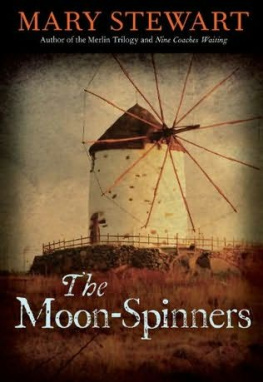Mary Stewart - Thunder on the Right
Here you can read online Mary Stewart - Thunder on the Right full text of the book (entire story) in english for free. Download pdf and epub, get meaning, cover and reviews about this ebook. year: 2004, publisher: HarperTorch, genre: Science fiction. Description of the work, (preface) as well as reviews are available. Best literature library LitArk.com created for fans of good reading and offers a wide selection of genres:
Romance novel
Science fiction
Adventure
Detective
Science
History
Home and family
Prose
Art
Politics
Computer
Non-fiction
Religion
Business
Children
Humor
Choose a favorite category and find really read worthwhile books. Enjoy immersion in the world of imagination, feel the emotions of the characters or learn something new for yourself, make an fascinating discovery.
- Book:Thunder on the Right
- Author:
- Publisher:HarperTorch
- Genre:
- Year:2004
- Rating:4 / 5
- Favourites:Add to favourites
- Your mark:
- 80
- 1
- 2
- 3
- 4
- 5
Thunder on the Right: summary, description and annotation
We offer to read an annotation, description, summary or preface (depends on what the author of the book "Thunder on the Right" wrote himself). If you haven't found the necessary information about the book — write in the comments, we will try to find it.
Thunder on the Right — read online for free the complete book (whole text) full work
Below is the text of the book, divided by pages. System saving the place of the last page read, allows you to conveniently read the book "Thunder on the Right" online for free, without having to search again every time where you left off. Put a bookmark, and you can go to the page where you finished reading at any time.
Font size:
Interval:
Bookmark:
Gavarnie is a real place, and the Gave and Gave d'Ossoue are real rivers. But the Vallee des Orages, with the convent and all its inmates, is entirely imaginary. So, too, are those people of Gavamie and Luz who come into this tale. If I have by mischance used the names of actual inhabitants of the district, I hope they will accept my apology and forgive me my error.
M.S.
The convent gate, set in the high, blind, white wall, was of dark wood, with an arched top and heavy wrought hinges. Jennifer, having pulled the old-fashioned bellpull, waited in the hot silence. A grasshopper, leaping across her shadow, spread parasol wings of palest powder-blue and the tiny lizard that flicked across the baked stone seemed part of the
same enchantment that hung around her in the stillness. The smell of the pinewoods beyond the far wall of the buildings was dark and aromatic, spellbinding, too, in the drifts of memory it cast across the clear air.
But the rosy-cheeked girl who at length opened the gate dispelled the last wisps of magic. She was, presumably, one of the orphans housed by the good sisters; she was very young, not more than fourteen, and her solid, sturdy body was clad in a dusty-blue cotton smock. Her face shone round and country-fresh as an apple, and her bare legs were brown as a nut. She grinned shyly at Jennifer, her round blue eyes curious.
Jennifer spoke in French.
"My name is Silver. Jennifer Silver. I believe I am expected: I have come to visit my cousin who is staying here Madame Lamartine."
The effect of this simple gambit was unexpected. The smile vanished from the cheery apple-face as quickly as a shadow wipes a high light from a pippin's cheek.
The child said nothing, but hugged herself a little nearer to the edge of the gate, very much as if she would have liked to shut it there and then.
"I hope," went on Jennifer politely, "that I haven't come at an inconvenient time? Am I allowed to come in?"
The girl still staring round-eyed, opened her mouth as if to speak, then shut it again, and shuffled her rope-soled slippers in the dust.
Jennifer, a little taken aback, began again. "If it's convenient" Then a thought struck her, and she asked, "You are French, aren't you, not Spanish?"
The girl nodded, hovering now, it appeared, on the edge of a nervous giggle.
"Then have the goodness," said Jennifer firmly, unable to imagine why a tongue-tied child should be appointed doorkeeper, "to take me to someone in authority. Take me to the Mother Superior, please."
At this, to her relief, the girl stood back and pulled the gate wider. But her eyes, still staring as if fascinated, held in them some element of uneasiness that Jennifer by no means liked. Under that childish china-blue brightness it was as if dismay lurkedyes, and some obscure horror. Something, at any rate, that was not just mere shyness and fear of strangers; something that was beginning to communicate itself to Jennifer in the faintest premonitory prickling of the spine. Something, Jennifer told herself sharply, that was being dredged up out of the depths of the subconscious, where half a hundred romantic tales had contributed to feed the secular mind with a superstitious fear of the enclosing convent walls. This, she added with some asperity, as she stepped past the staring orphan into a tiny courtyard, was not a story in the Radcliffe vein, where monastic cells and midnight terrors followed one another as the night the day; this was not a Transylvanian gorge in the dead hour of darkness. It was a small and peaceful institution, run on medieval lines perhaps, but nevertheless basking quietly in the warm sunshine of a civilized afternoon.
Nor, indeed, was the courtyard across which the orphan now began to lead her even remotely suggestive of flagellations, of nuns walled up alive, or of the other commonplaces of fictional convent life. Heat and light beat back in tangible waves from the beaten dust of the floor, and from the white walls where hanging creepers, partly masking the glare, drooped heavily around the arched windows. The yard was unbelievably still and hot, a little well of stillness where you almost had to push through the palpable heat of the air, and, at its center, like a symbol, the well itself stood ankle-deep in parched grass, the bucket hanging motionless, bone-dry, from the rope.
The two wings of the convent building formed the south and east walls of the courtyard, and at their junction stood the chapel, with its square tower jutting up above the roofs. The girl led the way diagonally across the yard toward this corner, where an archway gave on to a stone passage, a kind of tunnel which skirted the end of the chapel, and led straight through the south block of the building into the gardens beyond.
Inside the tunnel it was dim, and beautifully cool. Jennifer paused a moment, gratefully, as the chill of the stone poured over her like a cold breeze. To her left a shallow flight of steps led upward into a flagged hallway; farther along the tunnel a heavy door, with a bellrope looped up beside it, suggested an entrance to the chapel.
Opposite the chapel door was another which, she found later, gave on to the refectory and kitchens, with the dormitories of the orphans and lay sisters above.
Her young guide led the way quickly up the steps into the hall, which was apparently the center of the main offices of the building. Here the sunlight met them again, but this time mitigated by the lovely traceries of stained glass, which laid its peacock train of gold and green and amethyst along the flags, to where the treads of an imposing staircase barred them.
"I suppose," began Jennifer, as her guide started in a great hurry for the stairs, "I suppose"
But the girl, with one vide apprehensive glance at her, plunged ahead, her bare legs twinkling rapidly through the jeweled light; vermilion, amber, emerald.... Stop, Caution, Go, thought Jennifer wildly, thrusting Mrs. Radcliffe back into the limbo from which she was irresistibly peering once more. She hurried after her guide, the variegated light flickering over her dress, and swimming into shadow on the paneled wall of the staircase, where saint after saint peered dimly from the brown varnish of small and undoubtedly mediocre canvases. St. Sebastian, of course, abundantly transfixed by arrows; St. Teresa on a cloud, miraculously suspended; a third and dimmer figure, withdrawn into the darkness of the varnish, but still indubitably surrounded by a flock of pigeons, geese, storks, bullfinches, and what looked remarkably like a cockatoo.... St. Francis and his friends slid back and down the shaft of the staircase as Jennifer, chasing after her guide, emerged into a long upper corridor, abundantly lit by the afternoon glare which struck now through plain windows against a white wall and a row of light-wood doors. And here, in niches between the windows, stood the saints again, triumphantly emergent from the obscurity of their canvases, little statues brave in the brightness of red and blue and gilt, with the varied gaiety of flowers around their feet.
Mrs. Radcliffe, defeated, dwindled and faded in the superfluity of light, and Jennifer spoke with a decision that brought the scurrying orphan to a halt halfway along the corridor.
'Tell me, please"the girl turned and faced her"shall I be able to see my cousin today?"
But here the orphan, to Jennifer's amazement and growing exasperation, suddenly clapped her hand to her open mouth, not quite in time to stifle a shrill nervous giggle.
Over her hand the blue eyes stared with the same fixed and disconcerting look. She gulped and said nothing.
"Now look," began Jennifer. Then, as the uneasiness of the girl's demeanor communicated itself to her yet again, she said in a voice sharpening with apprehension: "Is anything wrong? Is my cousin ill? She is here, isn't sheMadame Lamartine?"
Font size:
Interval:
Bookmark:
Similar books «Thunder on the Right»
Look at similar books to Thunder on the Right. We have selected literature similar in name and meaning in the hope of providing readers with more options to find new, interesting, not yet read works.
Discussion, reviews of the book Thunder on the Right and just readers' own opinions. Leave your comments, write what you think about the work, its meaning or the main characters. Specify what exactly you liked and what you didn't like, and why you think so.













